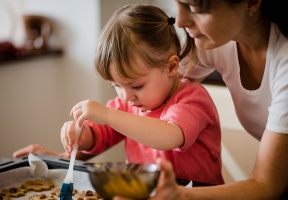By: Susan Glassman, Nutrition and Wellness Educator, University of Illinois Extension
 Holiday baking brings family and friends together and creates lasting memories as friends share recipes, stories, and meaningful time together. Amid the flurry of flour-covered countertops and mountains of messy mixing bowls, keep food safety in mind. “Baking and food safety go hand-in-hand,” says Susan Glassman, nutrition and wellness educator with University of Illinois Extension. “Make sure that your holiday baked goods bring you nothing but deliciousness by taking precautionary measures to prevent foodborne illness.” Raw dough and batters contain raw eggs and flour, two ingredients that can lead to food poisoning if eaten raw. Raw eggs can carry Salmonella bacteria. The harmful bacteria Escherichia coli (E. coli) can contaminate flour – from its original grain form in the field through the processed stage sold to consumers. Both bacteria can cause mild to severe symptoms of food poisoning.
Holiday baking brings family and friends together and creates lasting memories as friends share recipes, stories, and meaningful time together. Amid the flurry of flour-covered countertops and mountains of messy mixing bowls, keep food safety in mind. “Baking and food safety go hand-in-hand,” says Susan Glassman, nutrition and wellness educator with University of Illinois Extension. “Make sure that your holiday baked goods bring you nothing but deliciousness by taking precautionary measures to prevent foodborne illness.” Raw dough and batters contain raw eggs and flour, two ingredients that can lead to food poisoning if eaten raw. Raw eggs can carry Salmonella bacteria. The harmful bacteria Escherichia coli (E. coli) can contaminate flour – from its original grain form in the field through the processed stage sold to consumers. Both bacteria can cause mild to severe symptoms of food poisoning.
Reducing the risk
Clean: Wash hands with warm, soapy water for 20 seconds before and during baking, including after handling raw eggs and flour or unbaked batters and doughs. Wear an apron, tie back hair, remove jewelry, and avoid licking fingers. Wash surfaces and utensils frequently. Clean kitchen countertops with a bleach solution (one teaspoon of unscented liquid bleach per four cups of water), rinse, and air dry. Wash bowls and equipment in a dishwasher or with hot, soapy water.
Separate: Keep raw eggs and flour separate from other ingredients, including cooling racks or finished baked goods. Flour can spread easily. Chop and dice fruit, nuts, and chocolate on clean cutting boards that are used for ready-to-eat foods, like vegetables, away from raw eggs and flour. Wash equipment and cutting boards that come in contact with raw eggs or flour dust in a dishwasher or hot, soapy water.
Cook: Cook dough and batters before consuming. Follow the directions for cooking baked goods at the proper temperature and time.
Chill: Follow recipe directions. Refrigerate raw dough immediately after preparing until it is ready to be baked. Refrigerate baked goods that contain cream, such as cream frostings, custards, no-bake cookies, or cheese fillings, as well as egg-based recipes, such as bread pudding. Keep baked goods covered to prevent contamination. Store them in a refrigerator or at room temperature depending on recipe directions.












